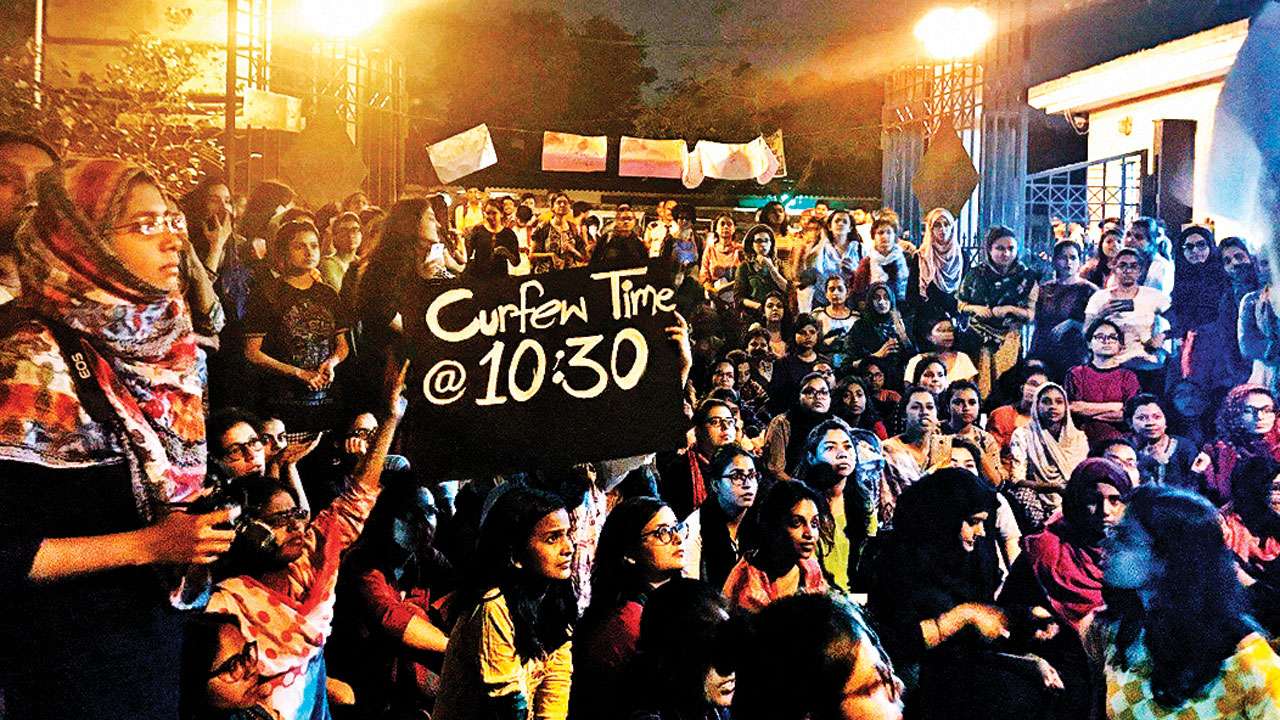As Jamia Millia Islamia reopens to a new academic session this week and new students begin to occupy the campus and explore the university and all that it is known for, this session might feel like something akin to betrayal for many old students who had departed with the big news that girls hostel’s curfew timing had been raised from 7.30 PM to 10.30 PM.
In March 2018, after months of protests, petitions and letters by women students and residents of Jamia Girls Hostel, the curfew had finally been moved from 7.30 PM to 10.30 PM. Many called it a historic achievement as it truly was the first of its kind.
However, during the vacations, the college silently pushed back its curfew to 9 PM, taking advantage of holidays and a silent campus (well, at least that’s an hour and a half more!). The new session brought along with it a list of new hostel guidelines that came as a shock to many, in which not only the curfew time for the women’s hostel had been rolled back to 9 PM, but any protest against the rules and regulations had also been threatened with consequences as strict as cancellation of admission from the university.
What is the fuss?
The achievement that was the night of 19th March was but short lived as the authorities re-imposed the same old rules as soon as they got the chance to, infuriating students once again. Azra Khursheed, the University provost, was quoted saying that during the ‘relaxation’ period of two months after the change in curfew timings, there had been a lot of ‘indiscipline’ reported. She told DNA, “We gave them two months and observed how the extended curfew time would work. There were many problems and now we have revised the brochures on the Vice-Chancellor’s command.”
The men’s hostel doesn’t even actively implement a curfew. However, in the case of the women’s hostel, Jamia has reverted to its old timings in the name of the good old ‘honour’ and ‘safety’ before practice could even begin to fall short of the ideal.
Why is it unfair… or is it?
At the time of admission itself, the university makes sure that parents and local guardians sign an undertaking taking full responsibility for their wards’ action. The University prospectus also has a disclaimer stating that the authorities have no liability towards the resident in case of any event that occurs outside the campus or hostel premises. The ‘safety’ excuse then falls a little short to justify the sudden sense of responsibility that the authorities have manufactured recently towards its women students.
The men’s hostel doesn’t actively implement a curfew. However, for women, Jamia has reverted to its old timings in the name of the good old ‘honour’ and ‘safety’.
To many, it feels like a dictatorship. “Since my parents do not trust the accommodation available locally around the place, I will have to reapply to the hostel even when I don’t want to. Staying in the hostel means not being able to do anything expect attend college, and life is much more than that”, a female hosteller shared.
Honestly, the timings are nothing short of betrayal to students who had hoped for a more flexible life in what becomes their second home when they come to study here. Umaima Shan Uroos, a resident of the hostel and a third year student of B.A.(P) said, “The way Jamia has betrayed us is not acceptable. It’s not about wanting to have fun or going out or even studying but that this is simply sexism. For a student like me whose classes end only by five in the evening, having only three to four hours for everything else is highly unfair and impractical.”
It’s high time we remind authorities that students – all students and not just male students – need not only attend classes and study, but also go out, interact with people and have a life apart from college. Being a college student does not and should not be restricted to only attending classes. This not only puts hostellers at a disadvantage from other students in terms of development, but also ends up controlling their entire lives being caught in this cycle of waking up, going to college and then coming back to the hostel again.
Difference in the timings of men and women’s hostels
Ask a male student what the curfew timing in the men’s hostel are, and I assure you he would have to refer to the book of guidelines to answer that question. This can’t be attributed to their ignorance alone, since Jamia authorities have done little to ‘safeguard’ male students in the hostel. Although the guidelines for ‘Hall of Boys’ Residence’ states 10 PM as the curfew timing for all its residents, it is not actively implemented and according to many of the students living there, they can “go in and out at any time”.
Sheema Arshian, a student of B.A. H.M.T.T. said, “It’s extremely shameful that hostel authorities are applying the same rules all over again. They have betrayed us yes, but they have also shown us that they cannot stick to their word and will not back down from devising new strategies to pressurise girls. If there aren’t different rules for boys and girls in the university, it is anything but fair to have different rules for us at the hostels.”
Jamia authorities have done little to ‘safeguard’ male students in the hostel.
While women have to do a lot to get a pass for staying out one night, from writing an application to getting their parents to call and confirm, men simply do not have any curfew actively in place. The university is hailing the reversal of the timing as a ‘safety’ issue – what makes them think that boys are safe? Are they not vulnerable to any harm? “Rape is not the only crime that happens in Delhi, and it’s not only girls that are raped…” a male student hosteller said, rightly bringing out the hollowness of such a claim.
Focusing on the wrong areas
Harmeetee Dutta, a student of M.A. Public administration who graduated this year said, “Hostel administration wouldn’t take any pains for real problems that we are suffering from. When I was a resident of the women’s hostel last year, they converted our common room into a dormitory and filled it with about 30 girls. We didn’t have an adequate number of washrooms back there, but the authorities seem to be fixed on all the wrong problems. The only reply we ever got by complaining about these is that many other women would happily take the hostel as it is and we could vacate it if we were having problems. I think there needs to be a reshuffling of the administration so we can allow new perspectives to shape up in the campus.”
Mixed opinions
“There are two sections of women in the hostel – one group that supports liberal ideas and the other group that doesn’t want any changes. On a personal level, I don’t have a problem with either, I would be happy if there was peace. I do agree that in a city like Delhi, people need their space besides college and I understand their frustration about the inflexibility of the timings. Being bound by just two places – college and hostel – can be frustrating, but on a second note the authorities are quoting that they sent out emails to concerned parents and have taken the decision by taking into consideration their opinions. I think it’s important to understand both sides before coming to a conclusion”, said Aiman, a student of Masters in Social Work and a resident of the women’s hostel.
Dissuading protests
As if the discriminatory rules were not enough, the university also issued guidelines to dissuade students from protesting against the prevailing rules and regulations of the hostel, even threatening to withdraw hostel facilities from those who indulged in any sort of ‘protests or signature campaigns against hostel rules, regulations and timings’. This clearly stands against the basic freedom of students and seeks to curb their right to protest as citizens too.
the university also issued guidelines to dissuade students from protesting against the prevailing rules and regulations.
In a recent development, after media backlash and an open letter addressed to the Jamia VC by Pinjra Tod, the prospectus has been revised and that clause has been removed.
We will not back out from the protest!
Muntaha Amin, a protestor and an M.A. student of Jamia associated with Pinjra Tod said, “We have created a new group called ‘Jamia Women Fight’ consisting of women against the discriminatory curfew timings at the hostels. Although we don’t have an official plan of action in place yet, we will not remain silent now. The administration will soon feel the heat.”
To conclude – for the hundredth time (because no one seems to get it) – what women need is not to be caged in the name of ‘protection’ but equal chances and opportunities at the campus and complete representation of their own. Not just that, we need stricter punishments and logical ways to deal with harassers instead of these regressive attempts at restricting the victims in the name of ‘safety’. Since protests are no longer criminalized, thanks to the open letter sent to the VC of Jamia, we can also expect a full blown protest sometime during August with Pinjra Tod and Jamia Women Fight also on board.
Also Read: Let’s Talk About How DU Women’s Hostel Fees Are Sexist
Featured Image Source: DNA India
About the author(s)
Can one take pride in calling herself an intellectual badass?




